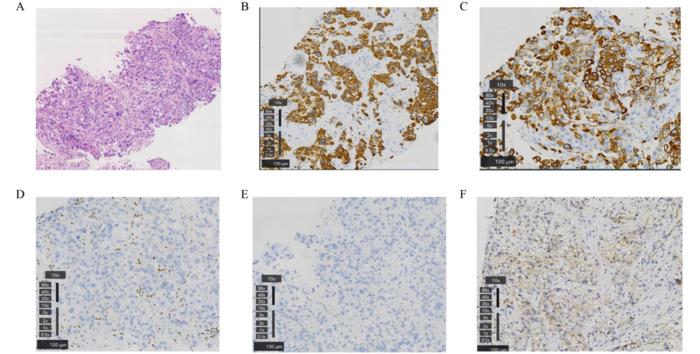Lung cancer remains a leading cause of cancer-related mortality worldwide, with various subtypes exhibiting unique molecular characteristics and treatment responses. Among these subtypes, non-small cell lung cancer (NSCLC) with SMARCA4 deficiency has garnered significant attention due to its aggressive nature and poor prognosis. Studies reveal that tumors with this deficiency are often characterized by a distinct histological pattern and a challenging treatment landscape. Notably, the emergence of rare mutations within known oncogenes like EGFR adds an additional layer of complexity to treatment strategies.
A recent case report documents the journey of a 53-year-old nonsmoking female patient who was diagnosed with SMARCA4-deficient NSCLC, highlighting her clinical presentation, diagnostic workup, and the dramatic therapeutic response to afatinib, an irreversible pan-erbB inhibitor. This case underscores the critical need for personalized treatment approaches in rare lung cancer phenotypes, especially those characterized by atypical genetic profiles. The patient’s initial symptoms included a one-month history of hoarseness alongside significant dyspnea, which prompted further investigation.
Upon clinical examination, healthcare providers noted multiple enlarged lymph nodes in regions critical to lymphatic drainage, including supraclavicular, submandibular, and axillary areas. Imaging studies revealed a mass in the right thoracic cavity with irregular borders, suggesting malignancy. Positron emission tomography scans confirmed significant metabolic activity within the soft tissue mass, indicating aggressive tumor behavior consistent with advanced-stage cancer. The classification of the tumor as cT2bN3M1c, corresponding to stage IVB, reflects its advanced nature and the challenge it posed to effective treatment modalities.
To further elucidate the tumor’s biology, a comprehensive immunohistochemical analysis was conducted. This revealed the absence of crucial markers like BRG1 and SALL4, while positive expressions of CK5/6 and CK7 were noted, thus validating the diagnosis of SMARCA4-deficient NSCLC. The detection of genetic mutations, specifically in EGFR exon 20 and exon 18, namely S768I and G719X respectively, added another layer to the molecular understanding of this case. Such mutations are infrequent yet not entirely absent in cases of SMARCA4-deficient NSCLC, indicating potential targetable pathways for therapeutic intervention.
Following the diagnosis, the patient was initiated on a treatment regimen of afatinib, a medication known for its effectiveness in targeting EGFR mutations. The standard dosing of 40 mg once daily was prescribed, and the patient’s clinical status was closely monitored. Remarkably, after one month of therapy, imaging studies revealed a significant reduction in both the primary tumor and metastatic lesions, showcasing the drug’s efficacy in this specific molecular context. The patient’s response serves as a critical reminder of the necessity for targeted therapies in aggressive lung cancer variants.
Subsequent chest computed tomography scans conducted at the three-month mark further validated the treatment’s impact, demonstrating the complete resolution of previously identified brain metastases. Such outcomes are particularly notable given the historical resistance of SMARCA4-deficient tumors to conventional chemotherapy regimens. Furthermore, the patient achieved a progression-free survival period of 17 months, a duration that exemplifies the potential for targeted treatments to dramatically alter the course of a highly aggressive cancer.
However, despite the initial success of the treatment, disease progression was ultimately inevitable. A repeat biopsy conducted at the time of progression confirmed the persistence of SMARCA4-deficient poorly differentiated carcinoma without the emergence of T790M mutations, a common resistance mechanism associated with EGFR-targeting agents. This finding emphasizes the need for ongoing research into the molecular dynamics of SMARCA4-deficient NSCLC, particularly how such tumors evolve under treatment pressure.
Following disease progression and the identification of persistent malignancy, the patient and her healthcare team made the compassionate decision to transition to palliative care. This decision, while difficult, reflects an important aspect of cancer management that prioritizes patient quality of life over aggressive treatment options that may no longer yield meaningful benefits. Tragically, the patient succumbed to her illness just one month after this transition.
The case of this patient with SMARCA4-deficient NSCLC and rare EGFR mutations illustrates the complexities of managing this aggressive cancer subtype. It highlights both the potential for targeted therapies to achieve significant responses in challenging scenarios and underscores the inevitability of treatment-resistant disease. These insights not only contribute to our understanding of the prognosis in SMARCA4-deficient cases but also urge clinicians to adopt a more individualized approach when considering treatment options for lung cancer patients.
Furthermore, this case points to the necessity for further research aimed at elucidating the mechanisms that allow for the coexistence of specific mutations with SMARCA4 deficiency. Understanding these dynamics is critical for developing more effective therapeutic strategies in the future. Moving forward, the oncology community must remain vigilant in exploring the molecular underpinnings of such complex cases to unlock new avenues for intervention.
In conclusion, the clinical experience presented strengthens the argument for the integration of molecular profiling in the treatment decision-making process for lung cancer. By identifying unique genetic mutations and understanding tumor biology, oncologists can tailor therapies that align with the individual characteristics of each patient’s cancer, thereby enhancing treatment efficacy and improving patient outcomes.
Subject of Research: People
Article Title: Non-small cell lung cancer with SMARCA4 deficiency harboring rare EGFR mutations exhibited significant tumor response when treated with afatinib: a case report
News Publication Date: 24-Feb-2025
Web References: DOI 10.1007/s11684-024-1118-y
References:
Image Credits: Xiaotong Qiu, Liangkun You, Chongwei Wang, Jin Sheng
Keywords: Lung cancer, SMARCA4 deficiency, EGFR mutations, targeted therapy, afatinib, case report, non-small cell lung cancer.
Tags: afatinib treatmentaggressive lung cancer subtypesdiagnostic workup for lung cancergenetic profiling in cancerlung cancer prognosislymphatic involvement in lung tumorsnon-small cell lung canceroncogene mutations in NSCLCpersonalized cancer therapyrare EGFR mutationsSMARCA4 deficiencytumor response case study





